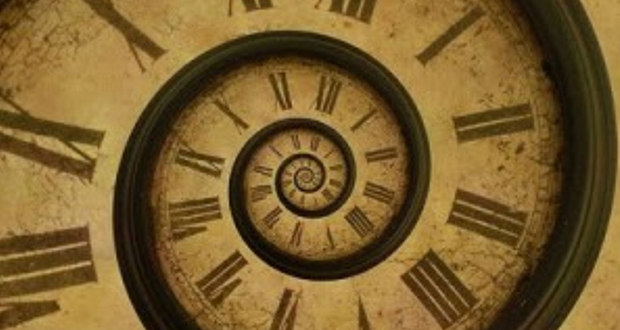What’s the difference between Sha’bān 1435 and Sha’bān 1436?
This question may seem confusing or pointless, but before you read on, I want you to ponder for a moment over what you feel the difference is.
Sha’bān is the month where last year’s account of good and bad actions for every individual ascends to Allāh. As we know, there are four instances when our actions ascend to Allāh: the daily record, weekly record, yearly record, and the whole life record. [1]
We are encouraged to do good and seek repentance especially in these instances. The daily record ascends twice, as the actions of the night ascend in the morning, and the actions of the day ascend in the night. It is due to this that it is from the Sunnah to seek forgiveness in the morning and the evening, as we want our sins to be forgiven before they ascend, and we want it to ascend while we are in a righteous state.
The weekly record also ascends twice, as it ascends every Monday and Thursday. It is also due to this that the prophet (SallaAllāhu ‘alayhi wasallam) used to fast every Monday and Thursday and he said, “Deeds are shown (to Allāh) on Mondays and Thursdays, and I like my deeds to be shown when I am fasting.” [2]
The whole life’s record ascends when we die, and since we never know when that is, nor are we usually strong enough to do good actions close to the pangs of death, we should always be in a constant state of repentance and seeking forgiveness from Allāh, as well as doing a lot of good actions.
As for the yearly record, it is reported that Usāmah ibn Zayd (may Allāh be pleased with them both) said: “I said, ‘O Messenger of Allāh, I do not see you fasting in any other month like you fast in Sha’bān.’ He (SallaAllāhu ‘alayhi wasallam) said, ‘That is a month to which people do not pay attention, between Rajab and Ramadān, and it is a month in which deeds are lifted up to the Lord of the Worlds. I like for my deeds to be lifted up when I am fasting.’” [3]
The answer to the question is that the difference is a whole year of your life has passed. A whole year of more than 350 days of actions recorded. The actions of the days are recorded, not neglecting any hour, nor second of each day. Ibrahīm al-Nakh’ī used to cry to his wife every Thursday, and she used to cry too and he used to say, “Today our actions will be put forth in front of Allāh”. So how about the actions of the whole year!
Sit down and try to reflect on what you did in the past year and try to remember the actions that will be put forth in front of Allāh.
How great is your heedless state of this great month and of your actions that will be put forth in front of Allāh?
How many sins have you committed this year?
How many harām gazes have you not restrained our eyes from this year?
How much of your brothers’ and sisters’ flesh have you eaten this year due to backbiting?
If you were present when someone was backbiting another, did you stop them? Or at least leave that congregation?
How many times did you listen to harām?
Did you protect your hands from falling into harām?
Did you stop your feet from taking you to harām?
How much good did you enjoin?
How much evil did you forbid?
How many hours did you waste?
How neglectful have you been of your brothers and sister around the world?
Was there a time when you ate something which caused Allāh to be angry with you?
Was there a word that you said which caused your place in Jahannam to dwell deeper than the distance between the East and the West?
Was there a time when you were alone, you were heedless of Allāh watching over you, and you committed sins which distanced you from Jannah and from your Lord?
How I wonder, what is our position in the eyes of Allāh at the end of this year?
Which of us will be brought closer, and which of us will be distanced further?
In this year, many people have made Jannah obligatory upon them due to the good they did, while others have made Jahannam obligatory upon them due to the evil they committed. Have you wondered which of these two types of people you are?
The hours of obedience make the air fragrant as the actions ascend to Allāh
The tears rolling down the eyes make the face full of light
The sadaqah given in secret accepted from The most Generous, The most Kind
The thirst during the voluntary fasts rewarded with rivers of wine, honey, and milk from The Most High
The gatherings of remembrance concluded with a mention of your name from Allāh to the angels who are closest to Him
Eyes protected from harām gazes are rewarded with seeing Allāh’s face
Ears protected from listening to harām are rewarded with hearing: “This is Jannah. You have inherited it due to what you used to do,” [4] and “Oh people of Jannah, it is your right to live, so you shall never die, and it is your right to be healthy, so you shall never be sick, and it is your right to be young, so you shall never age, and it is your right to enjoy yourself, so you shall never be grieved.” [5]
Limbs washed with water from wudū will be lit up on a day of complete darkness.
High levels in Jannah have been achieved by people who have used their time wisely, yet we remain where we are, still unable to fulfil the obligations as commanded by Allāh, still unable to pray on time, still unable to pray in the Masjid. When is the time for us to wake up from this heedless state and realise what we have done and repent and ask Allāh for forgiveness?
You may be asking, “What do you want me to do now?” My brothers and sisters, every day that has passed in this previous year has been an extra chance for you to do good, and now that you have looked back at what you have done and what will be put forth in front of Allāh, it is time to realise that Allāh has blessed you by letting you live until this day. So many people have died during the past year, yet Allāh has let you live, and even let you read this reminder to encourage you to turn back to Him, so now is the time to do so.
We are now in Sha’bān, so make sure you make full use of it, and repent and seek forgiveness from Allāh for all your sins and shortcomings, so that they are forgiven before they ascend to your Lord. Sha’bān is a month which many people neglect, and the Prophet (SallaAllāhu ‘alayhi wasallam) and the salaf used to do a lot of worship during the times that people neglect. Imagine you are worshipping Allāh at a time which many people neglect, and when Allāh looks at His creation during that time, only a few humans are engaging in worship, and you are one of them! Sha’bān is a time of fasting, as the prophet (SallaAllāhu ‘alayhi wasallam) used to fast the majority of this month, so ensure you follow his Sunnah and increase in fasting. Also, make sure you prepare yourself for Ramadān by increasing in qiyāmul-layl, reading the Qur’ān, voluntary prayers, constant dhikr, so that when Ramadān comes, you are fully prepared for it and are already used to doing righteous actions.
Finally, I would like to remind you brothers and sisters that you will never see from good except its signs, and you will never see from bad except its signs, for all the good is in Jannah and all the bad is in Jahannam, so make sure you are not deceived by material deceptions and swap them for what is really good. And know that every life has its people, so make sure you are from the people of the hereafter, and not the people of this life.
May Allāh increase us in good and make us from the ones who remember as soon as a shaytān whispers in our ears. O Allāh, increase our life so that we reach Ramadān and make it our most fruitful Ramadān to date.
[donationbanner]
Source: www.islam21c.com
Notes:
Much of this article has been incorporated from a previously written article in Arabic, found here: http://www.islamway.com/?iw_s=Article&iw_a=view&article_id=7739
[1] A discussion of the ascension of these different records and their respective proofs can be found in Tarīq al-Hijratayn wa Bāb al-Sa‘ādatayn by Ibn al-Qayyim
[2] Recorded in Tirmidhi
[3] Recorded in Nasā’i
[4] Al-Qur’ān 43:72
[5] Recorded in Muslim










Jazakumulahu khaira for this useful piece. May Allaah count us among the righteous and may He make this task easy for us. Aameen
Beneficial reminder. Jazaak Allah Khair ya Akhi.
These teachings are great, however, these exclude the worldly benefits hidden in the teachings of Islam. The fact is that Allah guides His servants to the best of this world and the hereafter. The early Muslims were guided to the technological developments solely because they followed the teachings of the Holy Qur’an and Sunnah.
This kind of approach is great from the life after death perspective, however, it ignores one main teaching of the Qur’an; that the good actions have their immediate reward in this dunya as well and Allah guides these people to the right path which the present Muslims miss so much.A little pondering over the state of early Muslims will reveal how their good actions guided them to the Falaah of this world as well as the hereafter.
Ameen..an excellent article, brilliant reminder. Need more articles like this inshaa Allah. May Allah reward you abundantly. Ameen
Jazaakallah khayran for this amazing reminder. This has to be the most clear cut no nonsense thing I have read about getting us to try and change our ways. May Allah, the Almighty, grant you goodness in everything. Goodness to your family, yourself and the things you do right up to the moment of your death and may you have a good end. Ameen.